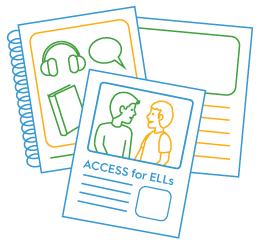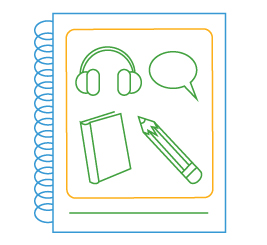Resources/Recursos
Featured Resources



All resources/Todos los recursos
Filter resources by:
Resources/Recursos
Can Do Descriptors Student Name Charts, Kindergarten
This chart allows educators to track students by their level of English language proficiency.
Resource Details View Download NowReleased June 2020
Can Do Descriptors Student Name Charts, Grade 1
This chart allows educators to track students by their level of English language proficiency.
Resource Details View Download NowReleased April 2020
Can Do Descriptors Student Name Charts, Grades 2-3
This chart allows educators to track students by their level of English language proficiency.
Resource Details View Download NowReleased April 2020
Can Do Descriptors Student Name Charts, Grades 4-5
This chart allows educators to track students by their level of English language proficiency.
Resource Details View Download NowReleased April 2020
Can Do Descriptors Student Name Charts, Grades 6-8
This chart allows educators to track students by their level of English language proficiency.
Resource Details View Download NowReleased April 2020
Can Do Descriptors Student Name Charts, Grades 9-12
This chart allows educators to track students by their level of English language proficiency.
Resource Details View Download NowReleased April 2020
WIDA Digital Wallpapers
Download "WIDA Wallpaper" to brighten your day! Six fun graphic designs are available for your desktop, laptop, tablet or smartphone. Share them with fellow educators and students to enjoy as they engage in virtual teaching and learning.
Resource DetailsReleased April 2020
Los descriptores Podemos: Kínder
Los descriptores Podemos (Podemos) ofrecen ejemplos de lo que los hablantes del español podemos realizar en cada uno de los niveles de desempeño lingüístico y en las cuatro formas de lenguaje: leer, escuchar, hablar y escribir.
Detalles del recurso Ver Descargar ahoraReleased March 2020
Los descriptores Podemos: 4.º y 5.º Grado
Los descriptores Podemos (Podemos) ofrecen ejemplos de lo que los hablantes del español podemos realizar en cada uno de los niveles de desempeño lingüístico y en las cuatro formas de lenguaje: leer, escuchar, hablar y escribir.
Detalles del recurso Ver Descargar ahoraReleased March 2020
Los descriptores Podemos: 6.º y 8.º Grado
Los descriptores Podemos (Podemos) ofrecen ejemplos de lo que los hablantes del español podemos realizar en cada uno de los niveles de desempeño lingüístico y en las cuatro formas de lenguaje: leer, escuchar, hablar y escribir.
Detalles del recurso Ver Descargar ahoraReleased March 2020
Los descriptores Podemos: 1.er Grado
Los descriptores Podemos (Podemos) ofrecen ejemplos de lo que los hablantes del español podemos realizar en cada uno de los niveles de desempeño lingüístico y en las cuatro formas de lenguaje: leer, escuchar, hablar y escribir.
Detalles del recurso Ver Descargar ahoraReleased March 2020
Design Principles for Engaging Multilingual Learners in Three-Dimensional Science
WIDA and the National Science Teaching Association formed Making Science Multilingual to support inclusive forms of science instruction through which all students, but especially multilingual learners, can learn science and language simultaneously. To guide this work, the Making Science Multilingual team devised eight design principles to define the integration of contemporary three-dimensional science and language-in-use pedagogies. These principles will guide educator resource development at both organizations and facilitate critical examination of how well educator resources support inclusion of multilingual learners in rigorous science learning.
Resource DetailsReleased February 2020
WIDA Speaking Rubric Grades 1-12
Use the WIDA Speaking Rubric to understand the scores students earn on ACCESS for ELLs (Online and Paper), analyze student performance in the classroom, and plan ways to scaffold language learning.
Note: Do not use this rubric to score WIDA assessments. Find relevant scoring tools in the appropriate WIDA assessment training course.
Resource Details View Download NowReleased January 2020
WIDA Writing Rubric Grades 1-12
Use the WIDA Writing Rubric to understand the scores students earn on ACCESS for ELLs (Online and Paper), analyze student performance in the classroom, and plan ways to scaffold language learning.
Note: Do not use this rubric to score WIDA assessments. Find relevant scoring tools in the appropriate WIDA assessment training course.
Resource Details View Download NowReleased January 2020
Language and Culture
In February, 2011, WIDA published a Focus Bulletin on Language and Culture, which was enormously popular, and which continues to be requested by readers. This Focus Bulletin has been reformatted and lightly edited to emphasize current WIDA resources and terminology.
This Focus Bulletin explores linguistic and cultural diversity in school, and how teachers, staff and parents can help multilingual learners feel welcome, confident, and prepared to succeed academically.
Published September 2019
Authors: Don Bouchard, Mariana Castro, Andrea Cammilleri
Released December 2019
Guiding Principles of Language Development (multiple languages)
These guiding principles of language development and learning exemplify WIDA’s overarching foundational beliefs and ever-present Can Do Philosophy. The guide includes research citations and defines WIDA's use of the term multilingual learner.
This guide, available in multiple languages, can be used as a resource for educators to share with parents and families.
Resource DetailsReleased September 2019
Less Than Four Domains: Creating an Overall Composite Score as an Indicator of English Language Proficiency for English Learners with 504 or Individualized Education Plans
The illustrated models and procedures can be applied to calculate overall composite scores to identify an indicator of English language proficiency, based on composite scores for English learners with 504 or individualized education plans who are missing one or more domain scores on the Assessing Comprehension and Communication in English State-to-State for English Language Learners assessment for state monitoring, achievement and accountability determinations.
Resource DetailsReleased May 2019
Language-Focused Planning Tool
How can PreK educators get started planning equitable learning opportunities for multilingual children? Use this language-focused planning tool to embed a language-focused approach to your planning.
Resource Details View Download NowReleased April 2019
WIDA MODEL and ACCESS for ELLs Concordance Table
WIDA research findings show that MODEL Online overall composite scale scores can predict overall composite proficiency level (PL) scores on ACCESS for ELLs. Use the table in this document to look up a student's overall composite scale score on MODEL Online and estimate the PL score that they would be likely to receive on ACCESS.
Resource Details View Download NowReleased April 2019
Less Than Four Domains: Creating an Overall Composite Score for English Learners with Individualized Education Plans
The analysis in this report illustrates models and procedures that can be used to assign a missing domain score in order to calculate an overall composite score. These methods only apply to assessments taken by English learners whose IEPs or 504 plans require they not be tested in one or more domains.
Resource Details View Download NowReleased March 2019




